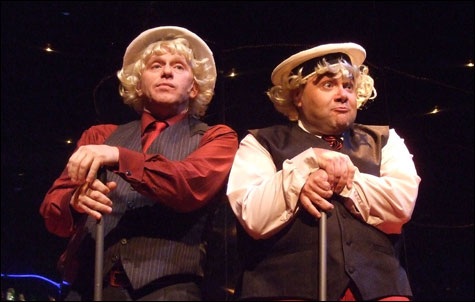A Marvelous Party; Mr. Marmalade; Misalliance

A MARVELOUS PARTY; Rigorous thespians slipping into something more comfortable.
|
Noël Coward may not have been born in a trunk, but he moved into one early. An actor from age 11, he was as steeped in the theater as an Eskimo Pie is in chocolate. Most of his songs are like little plays, and it takes singing actors, more than chanteuses, to deliver them. In
A MARVELOUS PARTY! THE NOËL COWARD CELEBRATION
, which the American Repertory Theatre is throwing at Zero Arrow Theatre (through July 29), that’s what you get in Remo Airaldi, Thomas Derrah, Will LeBow, and Karen MacDonald: rigorous thespians slipping into something more comfortable. Derrah is the most accomplished vocalist — as he proves on the haunting “Matelot” (from the 1945 revue Sigh No More), which Coward correctly pronounced “one of the best songs I ever wrote.” Not all of the torchers in A Marvelous Party fare so well. But the ART’s quartet of dressed-up, debonair stalwarts can carry a tune, no bucket required, and their renditions of the novelty numbers, known and unknown, are delicious.
A Marvelous Party, the first revue to win Coward-estate approval in 35 years, was devised for Rochester’s Geva Theatre and Chicago’s Northlight Theatre; the Chicago staging won a 2006 Jefferson Award. But don’t look here for snippets of Private Lives. There are candid, pithy, even revelatory excerpts from Coward’s diaries and autobiographies and an amusingly scathing scene from the 1956 comedy South Sea Bubble. But the emphasis is on Coward the songwriter, with material stretching from 1929 to 1963, from the meltingly melancholy “If Love Were All,” in which the composer rues his “talent to amuse,” to the jingly “What Ho Mrs. Brisket!”, in which he demonstrates it.
ART has reassembled the fabulous cabaret of The Onion Cellar, with musical director Will McGarrahan standing in for Amanda Palmer on piano; it’s as if Coward were performing his fabled Vegas act all over some mirrored, neon-lit cave. And director Scott Edmiston makes use of every quarter of the space, from its several stages, stair, and catwalk to a stool at the bar from which, brandy in hand, MacDonald applies her comic chops to the tale of an increasingly sloshed and liberated, if properly hyphenated, English widow in “A Bar on the Piccola Marina” and LeBow, rumbling into his pint, sloshes exasperation on “The Stately Homes of England.” Other comic highlights include Airaldi’s rendition, abetted by Carmen Miranda headgear and maracas, of “Nina,” Coward’s hilarious putdown of rhythm and lust south of the border. All is not bon mot and bubbly: you’ll hear “Mad About the Boy” better sung than it is by MacDonald, and yet she nails the ache, as opposed to the ecstasy, of capitulating to love.
“Children will listen,” warns Stephen Sondheim in Into the Woods, and there may be no more hilarious proof of that than Noah Haidle’s 2004
MR. MARMALADE
(presented by Company One at the BCA Plaza through August 11), an absurdist cautionary tale in which a four-year-old girl’s imaginative play mirrors the dysfunctional home life she’s absorbed. Desperate Housewives meets a South Park sensibility in this disturbing if flippant freshman effort from the 28-year-old, Juilliard-trained Christopher Durang acolyte who is also the author of Persephone, which the Huntington Theatre Company recently produced. Mr. Marmalade, which is getting a delightfully rambunctious area premiere from Company One, is every bit as inventive and wacko as Persephone, but it’s also touching — and has somewhere to take its original idea.
Pigtailed and wearing a tutu attached to blue jeans over tie-dyed leggings, Lucy is a worldly toddler whose imaginary friend, the briefcase-carrying figment of the title, is a busy businessman who has little time to play with her. And when he does carve out a few moments to sip coffee from a tiny plastic cup while placating his needy inventor with the promise of a Mexican vacation, there are hints of trouble behind the charming façade. Bradley, Mr. Marmalade’s equally imaginary assistant, shows clear signs of abuse. The stressed if successful boss has a temper — not to mention a fondness for porn and cocaine. So it’s hard not to root for corporeal if ADD-afflicted five-year-old Larry, tag-along stepbrother of Lucy’s babysitter’s boyfriend, who turns up jumping, gesticulating, and lisping, weighed down by his tiny backpack if not by a brightly recounted recent suicide attempt. Larry has imaginary friends as well: roughhousing plants that threaten his burgeoning relationship with the lonely Lucy as surely as Mr. Marmalade’s dark side does her make-believe alliance.
The toddlers (not to mention the plants) are played by young adults, who in Shawn LaCount’s crackling production capture the enthusiasm and the heartache of resilient if wounded kids mimicking the warped domesticity they’ve witnessed. Mr. Marmalade is embodied by a Pee-wee Herman–esque John Kuntz, hopping into the frame of Lucy’s New Jersey living room to little musical pings, then morphing from business-suited courtier to porn-spilling jerk to rehabilitated supplicant to surly, beer-swilling threat. Equal parts executive, menace, romantic, and clown, Kuntz is no easy act to equal. But Rachael Hunt, the expressive dynamo of a Lucy, and Greg Maraio, a breathlessly hyperactive Larry, give him a run for his marmalade.